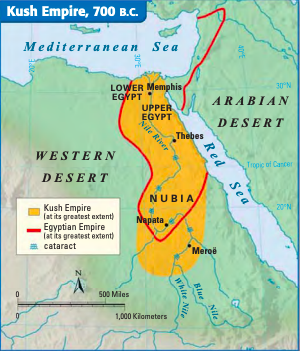Chapter 4 - First Age of Empires
4.1 - The Egyptian and Nubian Empires
- Some historians claim that another Asiatic population, the Hebrews, settled in Egypt during the Hyksos' reign.
- Around 1800 B.C., Abraham and his family crossed the Euphrates River and arrived in Canaan, according to the Bible.
- The descendants of Abraham then relocated again, this time to Egypt, circa 1650 B.C.
- Because the two groups were racially similar, some historians believe the Hyksos urged the Hebrews to settle there.
- The Egyptians despised the Hyksos' presence in their country, but they were helpless to expel them.
- Around 1400 B.C., the Egyptians conquered parts of Syria and Palestine, bringing them into battle with the Hittites. Around 1900 B.C., the Hittites arrived in Asia Minor and later advanced southward into Palestine.
- Invaders known as the "Sea Peoples" assaulted both the Egyptian empire and the Hittite kingdom, according to Egyptian literature.
- The Philistines, who are referenced frequently in the Bible, could have been among these invaders.
- Regardless of who they were, the Sea Peoples wreaked havoc.
- Other attacks were launched against the Egyptians. The Palestinian tribes repeatedly rebelled against their Egyptian masters in the east.
- The wide desert in the west no longer served as a deterrent to Libyan incursions on Egyptian settlements.
 4.2 - The Assyrian Empire
4.2 - The Assyrian Empire
- Their flat, open territory made them an easy target for attackers. Invaders from the neighboring highlands frequently swept down into Assyria.
- In response to these invasions, the Assyrians may have acquired their warlike character.
- Assyrian rulers developed an empire that spanned from east and north of the Tigris River all the way to central Egypt through relentless conflict.
- Assyria was a society that placed a premium on military might. Its troops were well-equipped to take down an empire.
- The soldiers encased themselves in stiff leather and metal armor, utilizing the ironworking technologies of the day.
- They wore copper or iron helmets, padded loincloths, and metal-scaled leather skirts. Iron swords and iron-pointed spears were their weapons.
 4.3 - The Persian Empire
4.3 - The Persian Empire
- He had started his career as a member of the king's bodyguard, a noble of the royal dynasty. Around 522 B.C., an elite force of Persian troops known as the Ten Thousand Immortals assisted Darius in seizing the throne.
- The first three years of Darius' reign were spent putting down revolts. He spent the following three years putting in place a well-organized and efficient administrative structure.
- Darius was a great warrior, but his true brilliance was in administration. Darius split his vast empire into 20 provinces to manage it.
- The homelands of the many groups of people who resided within the Persian Empire were essentially similar to these provinces.
- The people of each province continued to practice their own faith under Persian control. They also spoke their own language and had their own set of rules.
- According to Zoroaster, the earth is a battleground where a tremendous battle is conducted between the spirits of good and evil.
- Everyone, according to Zoroaster, is expected to participate in this conflict.
 4.4 - The Unification of China
4.4 - The Unification of China
The Legalists were a group of practical political theorists who stood in stark opposition to Confucius and Laozi's followers.
- They felt that restoring social order required a highly efficient and powerful administration.
- Their name comes from their view that the government should utilize the law to resolve civil unrest and restore peace.
Shi Huangdi was despised by scholars for his book-burning. Poor people despised him because he compelled them to work on the construction of a massive defense wall.
- Previously, Zhou monarchs had built smaller barriers to deter northern nomad assaults.
- Shi Huangdi was adamant about filling in the holes and extending the wall nearly the entire length of the empire's frontier.
- To get past it, enemies would have to gallop almost to Tibet.
\n